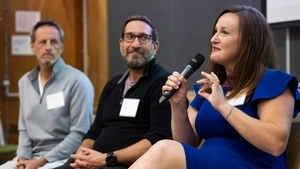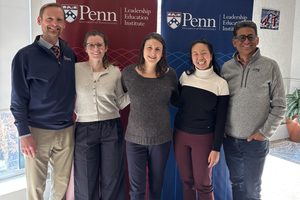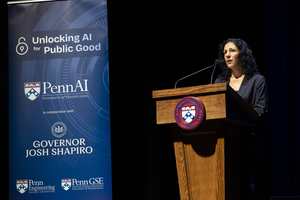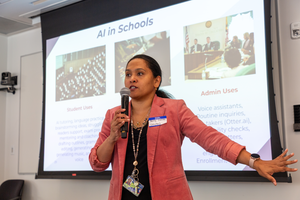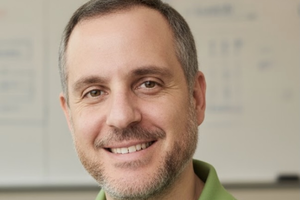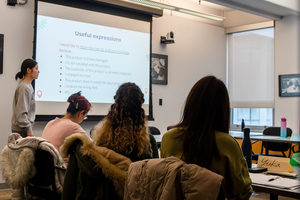The Penn Literacy Network (PLN) has launched an effort to support rural Pennsylvania students and transform the multibillion-dollar tutoring industry by helping high school students develop the social-emotional skills and metacognitive self-awareness needed to model what it means to be an effective learner.
The initiative is being undertaken in partnership with Thinkist, a public benefits corporation with an established curriculum and technology stack for delivering online training and support to peer math tutors. It’s funded with a four-year, $2.2 million Rural Postsecondary and Economic Development grant from the U.S. Department of Education.
The ultimate aims are to train nearly 2,000 Pennsylvania 11th and 12th graders to tutor nearly 4,000 of their middle-school peers, open a new pipeline into the teaching field, and serve as a model for the kind of innovative research–practice partnership prized by Catalyst @ Penn GSE, the center in which PLN is housed.
“We’re really thinking about this from a standpoint of not just working to help kids in math, but supporting high school students who are the future of all the work happening in schools,” said PLN Executive Director Lara Paparo, who received her doctorate of education from Penn GSE in 2022.
Deep roots in education
Paparo, whose grandfather and mother both earned doctorates from Penn GSE and ran PLN before her, initially aspired to a career in law.
But as an undergraduate student at Franklin & Marshall College, Paparo began tutoring a sixth grader in social studies. The experience eventually led her to become a high school history, civics, and government teacher in the Penn Manor School District.
The lesson?
“Kids need to be bitten by the teaching bug early,” Paparo said.
That’s a central aim of the new peer-tutoring initiative. Participating high school students take a practicum course developed by PLN and Thinkist and can earn up to six free undergraduate credits from Penn. The training these high school students receive focuses on identifying their own purpose as learners and understanding the science of how learning actually happens. From there, the tutors work on translating the results into practical teaching strategies and techniques, not just for explaining difficult math concepts, but for teaching their peers how to take control of their own learning.
“A lot of schools already have peer-tutoring programs, but their tutors are high-performing students who don’t necessarily know how to support another student who is struggling,” Paparo said. “So we support them in understanding how you break down questions and how you normalize confusion and it being OK to not know the answer.”
Focusing on tutors
A shared conviction in the benefits of that approach is what brought PLN and Thinkist together.
Thinkist CEO Jared Wells, who helped found and served as assessment director for California’s acclaimed High Tech High charter school network, came into the partnership with his own extensive background in student-centered, inquiry-driven education.
The company’s “metasocratic” tutor-training approach is “really about modeling what it means to be a learner, to struggle and persevere,” he said.
The resulting curriculum, developed by Wells and Thinkist co-founder and Chief Educational Officer Mark Manasse and updated with input from Penn GSE, includes two levels of training.
The first, called Foundations of Professional Tutoring, stresses the importance of kindness, confusion, and student agency.
“When we cultivate emotional skills first, we unlock students’ ability to explore, question, and problem-solve with confidence and curiosity,” Manasse said. “Confusion is normal. When we stop fearing it, we become free to ask better questions and find creative solutions.”
The second level of training, called Becoming an Educational Professional, seeks to provide peer tutors with the leadership skills and sense of purpose that might carry them into education careers.
Both represent a marked departure from the tutoring field’s narrow focus on improving academic outcomes for struggling students being tutored.
“Our [approach] is really more geared toward the tutors themselves,” Paparo said. “We are really focused on what they need to be successful.”
Modeling effective partnership
The initiative launched its first three pilot cohorts in September. About 50 students from across Pennsylvania are currently being trained as peer tutors.
One reason to watch what happens next is the national teacher shortage and the education sector’s ongoing struggle to diversify its workforce; PLN and Thinkist hope to demonstrate that peer tutoring can be a pathway into the field for students who have historically been excluded from the field.
Another reason is money. In the wake of the pandemic-related school closures and online schooling that disrupted millions of students’ learning, thousands of districts across the country turned to “high-dosage” tutoring as a solution. But with federal COVID relief dollars now drying up, many of those districts are looking for lower-cost options to sustain what they started.
In the big picture, both Paparo and Wells said, the hope is to demonstrate the power of thoughtful, well-aligned research–practice partnerships that bring the research and grant management expertise of universities together with the technology and business acumen of private-sector companies in service of a shared goal.
Succeed, and the effort will be a significant feather in the cap of Catalyst @ Penn GSE, founded in 2017 to promote exactly this kind of innovative cross-sector collaboration.
“This is the dream of so many organizations and ed-tech companies,” Paparo said. “Research and practice coming together to support students, teachers, and schools in a really measurable and hopefully sustainable way.”
Media Inquiries
Penn GSE Communications is here to help reporters connect with the education experts they need.
